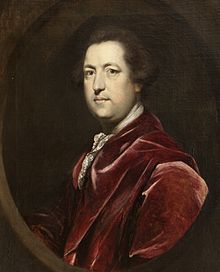Townshend Acts
The Townshend Acts , named after the British Treasury Secretary Charles Townshend , who introduced them, were laws passed by the British Parliament on June 29, 1767 , which imposed duties on the importation of various goods from Great Britain into its American colonies. The goods listed in the laws were items of everyday use, for example tea, glass, lead, paints, lacquer, paper and leather.
This decision is in connection with the so-called Stamp Act , the stamp duty law, which was passed two years earlier, which was intended to oblige the colonies to pay a stamp duty on all correspondence. As the result was strong resistance from the colonists in the Thirteen Colonies , the Stamp Act 1766 had to be withdrawn. With the Townshend Acts it was intended to restore the authority of the motherland over the colonies. For this purpose, three special courts, the Admiralty Courts , were created to ensure the enforcement of customs duties.
Nevertheless, there was resentment among the colonists against this decision, which they perceived as a renewed provocation. The so-called sons of freedom united under the slogan “ no taxation without representation ” (“no taxation without political say”), which was coined by James Otis Jr. Opponents of the tariffs called for a boycott of British goods and the tariffs were increasingly being undermined by smuggling . The center of the boycott movement was the city of Boston , where Samuel Adams led the anti-British agitation. In view of these violent reactions, voices against the Townshend Acts were also raised in mainland Britain, especially from business circles, where the American boycott reactions were most clearly felt.
These protests forced the British government to withdraw the Townshend Acts. However, in order to make it clear that in principle one adheres to the tax law , the tea imported into the Thirteen Colonies was excluded from the withdrawal of taxation. The British East India Company , threatened with bankruptcy, had a surplus of unsold tea at the beginning of the 1770s and the Tea Act of 1773 allowed the East India Company to deliver its tea directly to the colonies, which was thus not affected by customs duties in England. The Americans saw it as an attempt to curb the smuggling of Dutch tea and a corruption to recognize the tea tax and the right to tax the English parliament. This was the trigger for the Boston Tea Party and ultimately for the American Revolutionary War .
Townshend revenues for the first year were approximately £ 295 and implementation costs are estimated at £ 170,000.
Individual evidence
- ↑ cf. Hans-Christoph Schröder : The American Revolution. An introduction , Verlag CH Beck, Munich 1982, pp. 44-45.
- ↑ cf. z. B. Bill Bryson : Made in America: an Informal History of the English Language in the United States , Black Swan, 1998, ISBN 0-552-99805-2 , p. 38.
literature
- Conser Jr. Walter H. - McCarthy, Ronald M .: Circular Letters, Costoms Officers, and the Issue of Violence: The Background to he Townshend Acts Resistence, in: Conser, Walter H. - u. A. Resistance, Politics, and the American Struggle for Independence, 1765-1775, Bolder (Colorado) 1986, pp. 119-134.
- Thomas, Leslie J .: The Nonconsumption and Nonimportation Movement Against the Townshend Acts, 1767-170, in: Conser, Walter H. - u. A. Resistance, Politics, and the American Struggle for Independence, 1765-1775, Bolder (Colorado) 1986, pp. 135-192.
- Christie, Ian R .: British Response to American Reactions to the Townshend Acts, 1768–1770, in: Conser, Walter H. - u. A. Resistance, Politics, and the American Struggle for Independence, 1765-1775, Bolder (Colorado) 1986, pp. 193-214.
